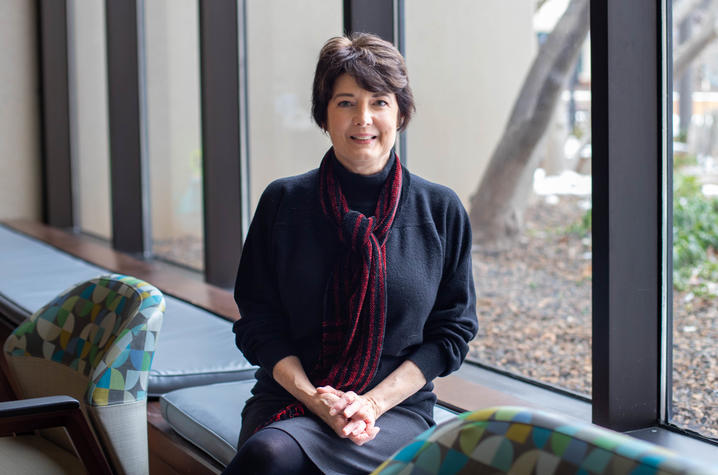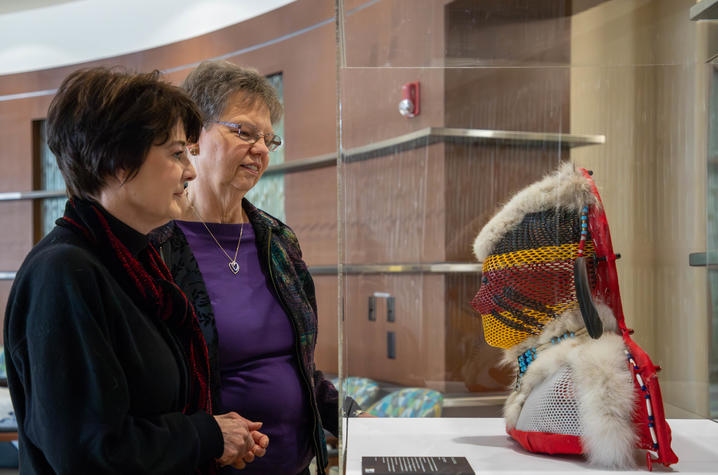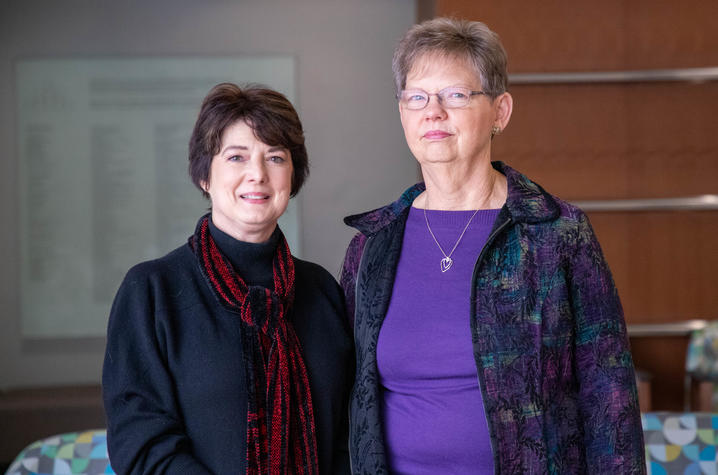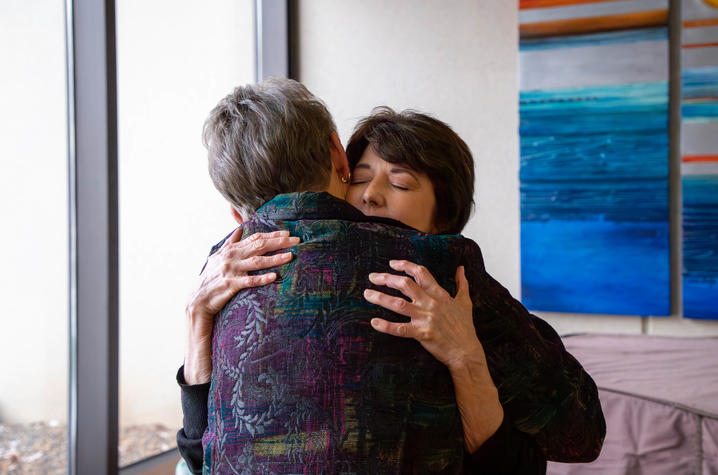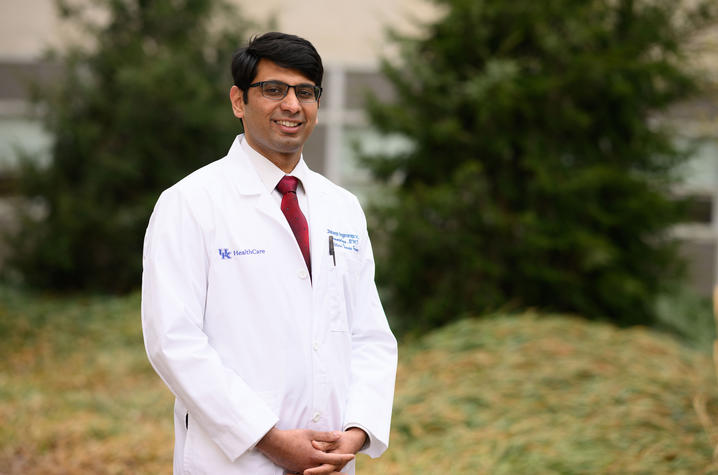Markey patient thriving after chance encounter leads to early diagnosis
LEXINGTON, Ky. (Jan. 24, 2024) — In the spring of 2022, Lexington resident Jan Carrico noticed she’d developed fever blisters and a lymph node on the left side of her neck was swollen. Thinking she was just fighting off a cold, the digital workplace communications manager at UK HealthCare, brushed off the symptoms and figured they would go away after some prayer and a few weeks.
But the swollen lymph node never went away. While Jan felt fine, she started to get a nagging feeling that maybe it was something more serious.
Weeks later, an acquaintance from Jan’s church named Paula Boycott invited her to lunch one day after service. After Jan found out that Paula was a former palliative care nurse at UK HealthCare, she asked for her opinion on the swelling in her neck.
Paula took one look and said, "You need to go see the doctor this week."
“She didn’t have to say anything,” Jan recalls. “The second she saw it, she just gave me this ‘serious nurse look.’ I knew right away that this was critical.”
A lifesaving diagnosis
Jan took her new friend’s advice and went to her doctor the following week, still never thinking it would lead to something like cancer.
An initial CT scan of the neck revealed an enlarged lymph node and an ultrasound-guided biopsy was not enough to make a diagnosis. Jan would need surgery to remove the entire lymph node for an accurate diagnosis. At the time, she was heading to Germany with her 20-year-old son, who was moving there for an internship. Her surgery with University of Kentucky Markey Cancer Center head and neck surgeon Rony Aouad, M.D., was scheduled the day after she returned.
“I still wasn’t too concerned about it because I felt good and didn’t have any other symptoms,” Jan said. “At the same time, I knew it was important to get back for the surgery to find out what was going on.”
After surgery, the results of the biopsy confirmed it was cancer – non-Hodgkin lymphoma. Jan met with UK Markey Cancer Center oncologist Chaitanya Iragavarapu, M.D., to go over the diagnosis and treatment plan. She had diffuse large B-cell lymphoma, the most common type of non-Hodgkin lymphoma, accounting for about 25% to 30% of cases. It is also the most aggressive type.
“I was hearing so much information, and I’m just coming to terms with a cancer diagnosis,” Jan said. “What my mind is really locked in on is, ‘Am I going to live or die?’”
Iragavarapu had reassuring news. Her diagnosis was treatable with chemotherapy and radiation.
“While this is one of the more aggressive types of non-Hodgkin lymphoma, it responds very well to chemotherapy,” said Iragavarapu. “Ms. Carrico was also stage 1, which typically has an excellent prognosis. Because she chose to follow up on something that did not make sense, and caught it early, it made a difference.”
Jan would undergo nine weeks of chemotherapy, followed by three weeks of daily radiation treatments to her neck.
Her new friend Paula was with her every step of the way. She accompanied Jan to her appointments, where she’d take notes, knowing how overwhelming information overload can be for a patient in her shoes. Both strong believers, Paula would also help Jan find comfort and encouragement through prayer.
“She was amazing,” Jan said. “Just her presence throughout my cancer journey made such a big difference, knowing there was someone there for support and that I wasn’t going through this alone.”
Jan continued to work as she struggled with treatment side effects like weakness, fatigue and hair loss. She decided to keep her diagnosis and treatment private – a secret only shared with family and close confidants. “I just didn't want people pitying me or thinking about the worst-case scenario,” she said.
A source of strength
Jan’s radiation treatments required the use of a stiff plastic mesh mask to secure her positioning. The device, commonly used on patients with head and neck cancer, can make them feel suppressed and confined during the treatment process.
“It’s not comfortable at all,” Jan said. “The mask holds you down and straps you in and you feel like you’re trapped.”
But the mask became an unexpected source of strength for Jan. As she went through treatment, she noticed a similar radiation mask on display in the lobby of Markey’s Ben F. Roach Cancer Care Facility. The art installation was decorated by a Markey patient to resemble a Native American warrior. He donated the piece, titled “Cancer Warrior” to encourage other patients to embrace the radiation mask as an instrument of healing.
“He turned something ‘bad’ and uncomfortable into something that represented healing and good, and it made him stronger,” Jan said. “It resonated with me because that’s the mindset I had – this challenging experience will make me stronger.”
A cancer ‘thriver’
On Oct. 3, 2022, Jan was considered “in remission” and completed her last radiation treatment the next month. The cancer was gone just as quickly as it came about, and the odds are high it will stay that way. There’s an 80% chance that she will stay in remission.
As her appointments at Markey become less frequent, her friendship with Paula remains strong. The two check in frequently and have formed a lifelong bond. Paula accompanied Jan at her last scan in October 2023, where again, she got all clear with no signs of cancer.
The words people choose to describe their cancer journeys are personal. “Warrior” defined the experience for the mask artist. Many others use “survivor.” Jan prefers to call herself a cancer “thriver.” She says the journey has moved her beyond mere survival – bringing many unexpected blessings.
“I now have deeper connections, a lifelong friend, a new life perspective, and a renewed passion for my work that is informed by my own patient experience,” Jan said. “It has been transformative.”
UK HealthCare is the hospitals and clinics of the University of Kentucky. But it is so much more. It is more than 10,000 dedicated health care professionals committed to providing advanced subspecialty care for the most critically injured and ill patients from the Commonwealth and beyond. It also is the home of the state’s only National Cancer Institute (NCI)-designated Comprehensive Cancer Center, a Level IV Neonatal Intensive Care Unit that cares for the tiniest and sickest newborns, the region’s only Level 1 trauma center and Kentucky’s top hospital ranked by U.S. News & World Report.
As an academic research institution, we are continuously pursuing the next generation of cures, treatments, protocols and policies. Our discoveries have the potential to change what’s medically possible within our lifetimes. Our educators and thought leaders are transforming the health care landscape as our six health professions colleges teach the next generation of doctors, nurses, pharmacists and other health care professionals, spreading the highest standards of care. UK HealthCare is the power of advanced medicine committed to creating a healthier Kentucky, now and for generations to come.





